unit6 How to Write a Rotten Poem with Almost No Effort
HOW TO WRITE A ROTTEN POEM WITH ALMOST

Some rotten poems
Thank you for comforting me when I'm sad Loving me when I'm mad Picking me up when I'm down Thank you for being my friend and being around Teaching me the meaning of love Encouraging me when I need a shove But most of all thank you for Loving me for who I am 感谢你在我伤心时安慰我, 当我生气时你护著我, 当我沮丧时你拉拔我。 感谢你作我的朋友并且在我身旁, 教导我爱的意义是什么, 当我需要动力时你鼓励我。 但我最想感谢你的是, 爱上像我这样的一个人。
Text Analysis
Modern life is more about material and tangible goods than about spirit pursuit. We set clear targets for our future, neglecting that we are gradually losing one joy that human kind usually have: the fun of spontaneity. The writer of this essay reminds us that poetry, especially creating poems, can provide us such pleasure. Though the writer of this essay writes in a half-mocking tone, and the method he introduces will not ensure us to create a wonderful, or even presentable poem, his real purpose is to make the creation of a poem less difficult than we may imagine and to induce amateurs to set their first steps on their journey to a more aesthetic life.
Unit 6 How to Write a Rotten Poem with Almost no Effort ppt课件
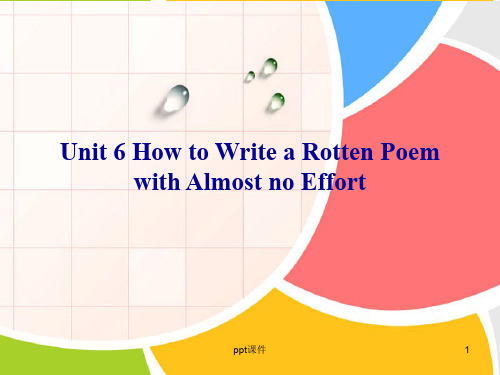
ppt课件
9
middle ground: an area of compromise or possible agreement between two extreme positions 中间地带;中间立场
Pr: 在一场辩论赛中,每个人都必须支持一方, 中间立场是不被接受的。
In a debate everyone has to take sides; middle ground is not acceptable.
evolve into 进化成;发展成;
evolve from 由...进化/发展而来
ppt课件
13
veritable: (adj.) real; genuine 真正的;名副其实的 Eg: It is a veritable heaven on earth.
Tr: 在现在这个社会,一个没有阅读习惯的人就是个真正的没 有信仰的人。
her heart pounding severelpypt.课件
8
• (P2) As a result, serious poets either starve or work as account executives. There is no middle ground.
Paraphrase: If anyone takes writing poetry as a serious job, he would either starve for he would find no place to sell his creations or he can only take a profitable job to earn his bread. There is no possible compromise between these two extremes.
课后答案Unit 6 How to write a rotten poem with almost no e
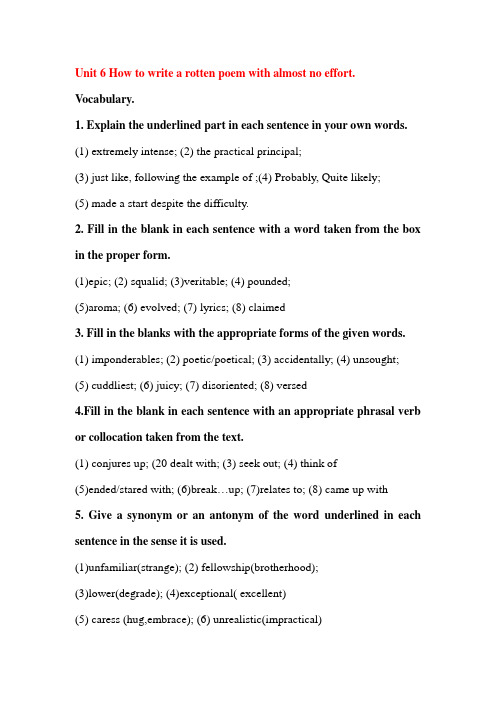
Unit 6 How to write a rotten poem with almost no effort. Vocabulary.1. Explain the underlined part in each sentence in your own words. (1) extremely intense; (2) the practical principal;(3) just like, following the example of ;(4) Probably, Quite likely;(5) made a start despite the difficulty.2. Fill in the blank in each sentence with a word taken from the box in the proper form.(1)epic; (2) squalid; (3)veritable; (4) pounded;(5)aroma; (6) evolved; (7) lyrics; (8) claimed3. Fill in the blanks with the appropriate forms of the given words. (1) imponderables; (2) poetic/poetical; (3) accidentally; (4) unsought; (5) cuddliest; (6) juicy; (7) disoriented; (8) versed4.Fill in the blank in each sentence with an appropriate phrasal verb or collocation taken from the text.(1) conjures up; (20 dealt with; (3) seek out; (4) think of(5)ended/stared with; (6)break…up; (7)relates to; (8) came up with5. Give a synonym or an antonym of the word underlined in each sentence in the sense it is used.(1)unfamiliar(strange); (2) fellowship(brotherhood);(3)lower(degrade); (4)exceptional( excellent)(5) caress (hug,embrace); (6) unrealistic(impractical)(7) skilled (expert,proficient,successful); (8) product (compositio6. Explain the underlined phrasal verbs in your own words.(1) affects; (2) catching up with; (3) been involved with; (4) tell exactly (5) rejected; (6)make understood; (7)tried to get; (8) thought seriously aboutGrammar.1. Complete the following sentences with the appropriate verb forms.(1) shake; (2) to do, wait, to let; (3) standing; (4) finding;(5) take, make, drink; (6) leave; (7) being spoken; (8) be, lookplete each sentence with what you think the most appropriate of the four choices given.1~4 CDBD 5~8 CAACTranslation.1.Sometimes, we have to make a choice because there is no middleground.2.He often conjured up visions of the past when he was free from thepressures of life.3.He often refreshed himself with a cup of strong black coffee when hefelt fatigued.4.He thrust past a throng of drunken men and bargaining women andwalked on through flaring streets.5.Experienced translators, though lacking in theory, can render onelanguage into another by rule of thumb.6.It was generally believed that the major purpose of the foreignminister’s trip was to break the ice with regards to the relations between the two countries.7.Reading good books and making friends with good people can elevatethe mind.8.The flowers and the colorful lights lent a festival atmosphere to thisancient small town.Exercises for integrated skills.2. Fill in each blank in the passage below with ONE word you think appropriate.(1)questions (2)will (3)ones (4)accounts(5)apply (6)as (7)need (8)at(9)wish (10)feel (11)music (12)case。
新编英语教程6课文翻译

第1单元避免两词铭记两词在生活中,没有什么比顿悟更令人激动,更有益处了,它可以改变一个人,不仅仅是改变,而且变得更好,当然这种顿悟的时刻很罕见,但仍然会降临到我们所有人身上,它有时来自于一本书,一次不到一句诗歌,有时来自于一个朋友,在曼哈顿一个寒冷的冬季下午,我坐在一个法国小餐馆儿里,倍感失落和压抑,因为我的几次错误估算,一个对我人生至关重要的项目落空了,就连马上要见到一个老朋友(这个老人,我常私下亲切的这样想到他)的念头,都不像以前那样让我兴奋,我坐在桌边,皱起眉头看着色彩多样的桌布,反复咀嚼着自己的失误。
他来了,穿过街道,裹着旧大衣,不成形的毡帽低低的压在光头上,看上去不像是一个有名的精神病医生,倒像是一个精力充沛的小土地神,他的几个办公室就在附近,我知道他看完今天的最后一个病人,他年近80,但仍然拎着装满文件的公文包,工作起来像一个大机构的主管,只要有空,他仍然爱溜去打高尔夫球。
他敏锐的观察力早已不让我感到惊奇,于是我就详细的把烦恼告诉了他,带着一丝忧伤的自豪,我尽量的陈述实情,对自己的失意,我只能怪自己,不怪任何人,我分析了整件事情,所有的错误判断,以及不明智的行动,我讲了约有15分钟,老人默默的喝着啤酒。
老人从纸盒里拿出一盒磁带,放进录音机,然后说,磁带上有到我这里来求助的三个人的简短录音,当然我不告诉你是谁,我想让你听听,看你是否能找出,一个两字短语,是三个案例所共有的。
他笑道,别这么困惑,我有我的理由。
在我看来,磁带上三个人所共有的不是愉快的事,首先讲话的是个男人,他显然做生意遭受了一些损失,或经历了失败,他怪自己工作不够努力,没有远见,第二个说话的是个女人,他一直未婚,因为他要对自己的寡母尽孝心,他痛苦的回忆了被自己放弃的所有嫁人的机会,第三个说话的是位母亲,她十多岁的儿子被警察抓了,她不停的责备自己。
老人关掉录音机,靠在椅子上:“这些录音中有一个充满微妙毒性的短语,反复出现了六次,你听出来了吗?没有,噢,这可能是因为几分钟前在餐馆里,你自己说了三次。
Unit-6-How-to-write-a-rotten-poem-with-almost-no-e
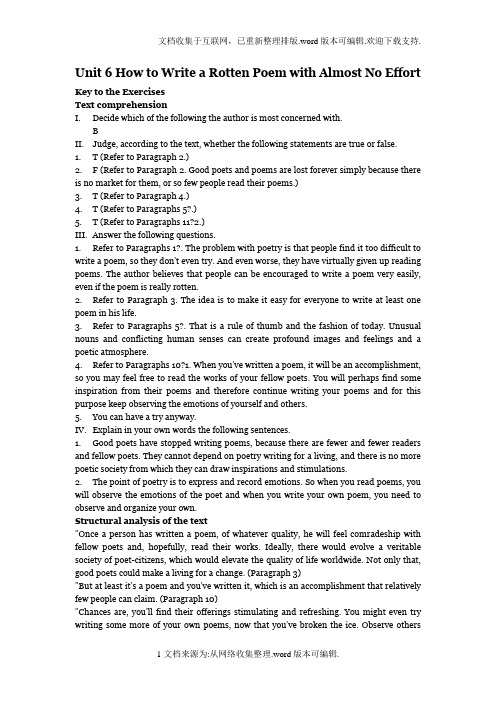
Unit 6 How to Write a Rotten Poem with Almost No EffortKey to the ExercisesText comprehensionI. Decide which of the following the author is most concerned with.BII. Judge, according to the text, whether the following statements are true or false.1. T (Refer to Paragraph2.)2. F (Refer to Paragraph 2. Good poets and poems are lost forever simply because there is no market for them, or so few people read their poems.)3. T (Refer to Paragraph4.)4. T (Refer to Paragraphs 5?.)5. T (Refer to Paragraphs 11?2.)III. Answer the following questions.1. Refer to Paragraphs 1?. The problem with poetry is that people find it too difficult to write a poem, so they don't even try. And even worse, they have virtually given up reading poems. The author believes that people can be encouraged to write a poem very easily, even if the poem is really rotten.2. Refer to Paragraph3. The idea is to make it easy for everyone to write at least one poem in his life.3. Refer to Paragraphs 5?. That is a rule of thumb and the fashion of today. Unusual nouns and conflicting human senses can create profound images and feelings and a poetic atmosphere.4. Refer to Paragraphs 10?1. When you've written a poem, it will be an accomplishment, so you may feel free to read the works of your fellow poets. You will perhaps find some inspiration from their poems and therefore continue writing your poems and for this purpose keep observing the emotions of yourself and others.5. You can have a try anyway.IV. Explain in your own words the following sentences.1. Good poets have stopped writing poems, because there are fewer and fewer readers and fellow poets. They cannot depend on poetry writing for a living, and there is no more poetic society from which they can draw inspirations and stimulations.2. The point of poetry is to express and record emotions. So when you read poems, you will observe the emotions of the poet and when you write your own poem, you need to observe and organize your own.Structural analysis of the text"Once a person has written a poem, of whatever quality, he will feel comradeship with fellow poets and, hopefully, read their works. Ideally, there would evolve a veritable society of poet-citizens, which would elevate the quality of life worldwide. Not only that, good poets could make a living for a change. (Paragraph 3)"But at least it's a poem and you've written it, which is an accomplishment that relatively few people can claim. (Paragraph 10)"Chances are, you'll find their offerings stimulating and refreshing. You might even try writing some more of your own poems, now that you've broken the ice. Observe othersemotions and experience your own -- that's what poetry is all about. (Paragraph 11) Rhetorical features of the text"The last line of your poem should deal with the future in some way." (Paragraph 8) "How that poem (like yours, when you're finished) is rotten." (Paragraph 10)Vocabulary exercisesI. Explain the underlined part in each sentence in your own words.1. extremely intense2. The practical principle3. just like; following the example of4. Probably; Quite likely5. made a start despite the difficultyII. Fill in the blank in each sentence with a word taken from the box in its appropriate form.1. epic2. squalid3. veritable4. pounded5. aroma6. evolved7. lyrics 8. claimedIII. Fill in the blanks with the appropriate forms of the given words.1. imponderables2. poetic/poetical3. accidentally4. unsought5. cuddliest6. juicy7. disorientated 8. versedIV. Fill in the blank(s) in each sentence with an appropriate phrasal verb or collocation taken from the text.1. conjures up2. dealt with3. seek out4. think of5. ended/started with6. break ... up7. relates to8. came up withV. Give a synonym or an antonym of the word underlined in each sentence in the sense it is used.1. Synonym: unfamiliar (strange)2. Synonym: fellowship (brotherhood)3. Antonym: lower (degrade)4. Antonym: exceptional (excellent)5. Synonym: caress (hug, embrace)6. Antonym: unrealistic (impractical)7. Synonym: skilled (expert, proficient, successful)8. Synonym: product (composition)VI. Explain the underlined phrasal verbs in your own words.1. affects2. catching up with3. been involved in4. tell exactly5. rejected6. make understood7. tried to get8. thought seriously aboutGrammar exercisesI. Complete the following sentences with the appropriate verb forms.1. shake2. to do, wait, to let3. standing4. finding(To in the expression with a view to is a preposition.)5. take, make, drink6. leave(When rather than appears at the beginning of a sentence, we use bare infinitive after it.)7. being spoken8. be, lookII. Complete the sentences using either the infinitive or the -ing form of the verbs in brackets.1. to drink2. turning3. to tell4. to give5. getting6. to check7. living 8. taking9. to lift 10. talkingIII. Put the verbs in brackets into the correct form.1. getting up, walking2. making3. carry4. getting5. leading6. live7. writing 8. stealingIV. Complete each sentence with what you think the most appropriate of the four choices given.1. C (We use the simple present to describe things that are always true or situations that exist now and will go on indefinitely.)2. D3. B4. D5. C6. A (In a formal style, the verb should be singular when the subject is "either".)7. A8. CV. Complete the following sentences with the appropriate forms of the verbs given.1. has been ringing2. had been made up3. will be giving4. comes5. would have6. was getting7. started(We use the past tense in the clauses after it's time, would rather, wish.)8. had been9. will improve/improves(The verb hope can be followed by a present tense with a future meaning, especially in the first person.)10. says(The simple present is often used in introducing quotations.)VI. Make sentences of your own after the sentences given below, keeping the italicized parts in your sentences.1. e.g. The course you are going to take will not be exciting. It won't even be interesting. But you will find it helpful in the long run.2. e.g. Now that you have written your first poem, you should not find it difficult to compose a second one.Translation exercisesI. Translate the following sentences into Chinese.1. 这一天你过得很糟糕,或是有了个绝妙的想法,又或者遭遇车祸,再或情场失意,你想把它永久记录下来。
how to write a rotten poem课件

how to write a rotten poem课件诗歌,是一种表达情感、展现美感的艺术形式。
而一首优秀的诗歌往往能够触动读者的心灵,让人产生共鸣。
但有时候,我们也可以尝试写一些“烂诗”,用一种戏谑、夸张、甚至是荒诞的方式来表达自己的情感和思想。
下面就来探讨一下如何写一首“烂诗”。
首先,要尽情发挥自己的想象力。
不必拘泥于传统的诗歌形式,可以随心所欲地写下自己的想法和感受。
可以是荒诞的情节,可以是夸张的表达,可以是离奇的结局。
只要能够引起笑声或者让人感到不可思议,那就是成功的“烂诗”。
其次,要善于运用夸张和反讽的手法。
通过夸大事实、颠倒是非,来制造笑料和戏谑的效果。
可以对社会现象进行讽刺,可以对自己的懦弱进行自嘲,可以对生活中的琐事进行夸张处理。
总之,要在荒诞和真实之间找到平衡点,让读者在笑声中思考。
另外,要注意节奏和韵律的运用。
即便是“烂诗”,也应该有一定的节奏感和韵律美。
可以适当运用顿挫、重复、押韵等手法,来增强诗歌的节奏感和吸引力。
这样不仅可以让诗歌更具表现力,也可以让读者更容易产生共鸣。
最后,要勇于尝试和创新。
写“烂诗”并不是一件容易的事情,需要不断地尝试和摸索。
可以从生活中的小事入手,可以从想象中的奇思妙想出发。
只要肆意发挥自己的想象力和创造力,相信总会写出一首让人捧腹大笑的“烂诗”。
总的来说,写“烂诗”是一种对诗歌形式的打破和挑战,是一种对传统审美的颠覆和重新定义。
通过夸张、荒谬、好笑的手法,可以让诗歌更具娱乐性和趣味性,让读者在笑声中感受到作者的思想和情感。
希望大家在写“烂诗”的过程中,能够尽情发挥自己的创造力,勇于尝试和创新,写出一首又一首让人捧腹大笑的佳作。
Unit-6-How-to-Write-a-Rotten-Poem-with-Almost-No-Effort课文翻译综合教程三
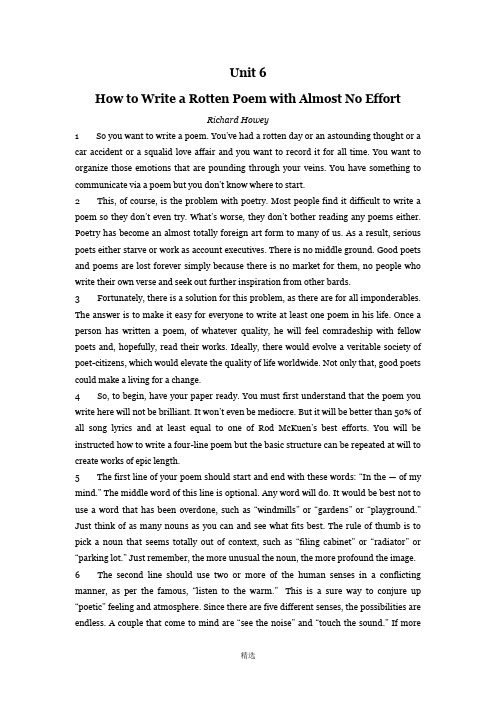
Unit 6How to Write a Rotten Poem with Almost No EffortRichard Howey1 So you want to write a poem. You’ve had a rotten day or an astounding thought or a car accident or a squalid love affair and you want to record it for all time. You want to organize those emotions that are pounding through your veins. You have something to communicate via a poem but you don’t know where to start.2 This, of course, is the problem with poetry. Most people find it difficult to write a poem so they don’t even try. What’s worse, they don’t bother reading any poems either. Poetry has become an almost totally foreign art form to many of us. As a result, serious poets either starve or work as account executives. There is no middle ground. Good poets and poems are lost forever simply because there is no market for them, no people who write their own verse and seek out further inspiration from other bards.3 Fortunately, there is a solution for this problem, as there are for all imponderables. The answer is to make it easy for everyone to write at least one poem in his life. Once a person has written a poem, of whatever quality, he will feel comradeship with fellow poets and, hopefully, read their works. Ideally, there would evolve a veritable society of poet-citizens, which would elevate the quality of life worldwide. Not only that, good poets could make a living for a change.4 So, to begin, have your paper ready. You must first understand that the poem you write here will not be brilliant. It won’t even be mediocre. But it will be better than 50% of all song lyrics and at least equal to one of Rod McKuen’s best efforts. You will be instructed how to write a four-line poem but the basic structure can be repeated at will to create works of epic length.5 The first li ne of your poem should start and end with these words: “In the — of my mind.” The middle word of this line is optional. Any word will do. It would be best not to use a word that has been overdone, such as “windmills” or “gardens” or “playground.” Just think of as many nouns as you can and see what fits best. The rule of thumb is to pick a noun that seems totally out of context, such as “filing cabinet” or “radiator” or “parking lot.” Just remember, the more unusual the noun, the more profound the image.6 The second line should use two or more of the human senses in a conflicting manner, as per the famous, “listen to the warm.”This is a sure way to conjure up “poetic” feeling and atmosphere. Since there are five different senses, the possibilities are e ndless. A couple that come to mind are “see the noise” and “touch the sound.” If morecomplexity is desired other senses can be added, as in “taste the color of my hearing,” or “I cuddled your sight in the aroma of the night.” Rhyming, of course, is option al.7 The third line should be just a simple statement. This is used to break up the insightful images that have been presented in the first two lines. This line should be as prosaic as possible to give a “down-to-earth” mood to the poem. An example wou ld be “she gave me juice and toast that morning,” or perhaps “I left for work next day on the 8:30 bus.” The content of this line may or may not relate to what has gone before.8 The last line of your poem should deal with the future in some way. This gives the poem a forward thrust that is always helpful. A possibility might be, “tomorrow will be a better day,” or “I’ll find someone sometime,” or “maybe we’ll meet again in July.” This future-oriented ending lends an aura of hope and yet need not be grossly optimistic.9 By following the above structure, anyone can write a poem. For example, if I select one each of my sample lines, I come up with:In the parking lot of my mind,I cuddled your sight in the aroma of the night.I left for work next day on the 8:30 bus.Maybe we’ll meet again in July.10 Now that poem (like yours, when you’re finished) is rotten. But at least it’s a poem and you’ve written it, which is an accomplishment that relatively few people can claim.11 Now that you’re a poet, feel free to read poetry by some of your more accomplished brothers and sisters in verse. Chances are, you’ll find their offerings stimulating and refres hing. You might even try writing some more of your own poems, now that you’ve broken the ice. Observe o thers’ emotions and experience your own —that’s what poetry is all about.12 Incidentally, if you find it impossible to sell the poem you write to Bobby Goldsboro or John Denver, burn it. It will look terrible as the first page of your anthology when it’s published.轻轻松松写烂诗理查德·豪伊1. 这一天你过得很糟糕,或是有了个绝妙的想法,又或者遭遇车祸,再或情场失意,你想把它永久记录下来。
课后答案Unit 6 How to write a rotten poem with almost no e

Unit 6 How to write a rotten poem with almost no effort. Vocabulary.1. Explain the underlined part in each sentence in your own words. (1) extremely intense; (2) the practical principal;(3) just like, following the example of ;(4) Probably, Quite likely;(5) made a start despite the difficulty.2. Fill in the blank in each sentence with a word taken from the box in the proper form.(1)epic; (2) squalid; (3)veritable; (4) pounded;(5)aroma; (6) evolved; (7) lyrics; (8) claimed3. Fill in the blanks with the appropriate forms of the given words. (1) imponderables; (2) poetic/poetical; (3) accidentally; (4) unsought; (5) cuddliest; (6) juicy; (7) disoriented; (8) versed4.Fill in the blank in each sentence with an appropriate phrasal verb or collocation taken from the text.(1) conjures up; (20 dealt with; (3) seek out; (4) think of(5)ended/stared with; (6)break…up; (7)relates to; (8) came up with5. Give a synonym or an antonym of the word underlined in each sentence in the sense it is used.(1)unfamiliar(strange); (2) fellowship(brotherhood);(3)lower(degrade); (4)exceptional( excellent)(5) caress (hug,embrace); (6) unrealistic(impractical)(7) skilled (expert,proficient,successful); (8) product (compositio6. Explain the underlined phrasal verbs in your own words.(1) affects; (2) catching up with; (3) been involved with; (4) tell exactly (5) rejected; (6)make understood; (7)tried to get; (8) thought seriously aboutGrammar.1. Complete the following sentences with the appropriate verb forms.(1) shake; (2) to do, wait, to let; (3) standing; (4) finding;(5) take, make, drink; (6) leave; (7) being spoken; (8) be, lookplete each sentence with what you think the most appropriate of the four choices given.1~4 CDBD 5~8 CAACTranslation.1.Sometimes, we have to make a choice because there is no middleground.2.He often conjured up visions of the past when he was free from thepressures of life.3.He often refreshed himself with a cup of strong black coffee when hefelt fatigued.4.He thrust past a throng of drunken men and bargaining women andwalked on through flaring streets.5.Experienced translators, though lacking in theory, can render onelanguage into another by rule of thumb.6.It was generally believed that the major purpose of the foreignminister’s trip was to break the ice with regards to the relations between the two countries.7.Reading good books and making friends with good people can elevatethe mind.8.The flowers and the colorful lights lent a festival atmosphere to thisancient small town.Exercises for integrated skills.2. Fill in each blank in the passage below with ONE word you think appropriate.(1)questions (2)will (3)ones (4)accounts(5)apply (6)as (7)need (8)at(9)wish (10)feel (11)music (12)case。
Unit 6 How to Write a Rotten Poem with Almost No Effort Words and Expressions综合教程三
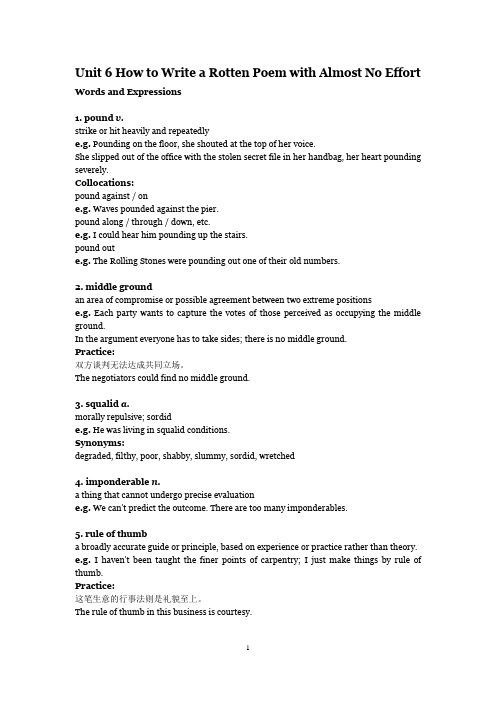
Unit 6 How to Write a Rotten Poem with Almost No Effort Words and Expressions1. pound v.strike or hit heavily and repeatedlye.g. Pounding on the floor, she shouted at the top of her voice.She slipped out of the office with the stolen secret file in her handbag, her heart pounding severely.Collocations:pound against / one.g. Waves pounded against the pier.pound along / through / down, etc.e.g. I could hear him pounding up the stairs.pound oute.g. The Rolling Stones were pounding out one of their old numbers.2. middle groundan area of compromise or possible agreement between two extreme positionse.g.Each party wants to capture the votes of those perceived as occupying the middle ground.In the argument everyone has to take sides; there is no middle ground.Practice:双方谈判无法达成共同立场。
The negotiators could find no middle ground.3. squalid a.morally repulsive; sordide.g. He was living in squalid conditions.Synonyms:degraded, filthy, poor, shabby, slummy, sordid, wretched4. imponderable n.a thing that cannot undergo precise evaluatione.g. We can't predict the outcome. There are too many imponderables.5. rule of thumba broadly accurate guide or principle, based on experience or practice rather than theory.e.g. I haven't been taught the finer points of carpentry; I just make things by rule of thumb.Practice:这笔生意的行事法则是礼貌至上。
unit6 How to write a poem如何写诗
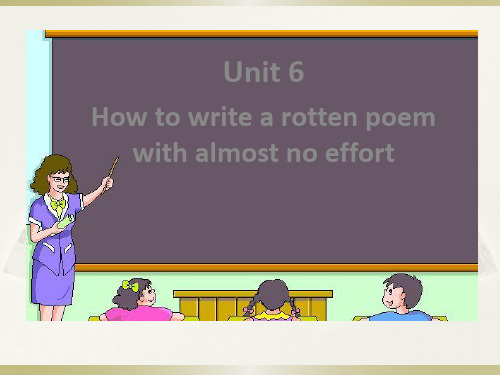
Warming-up Activities:
1.
A brief introduction to the Chinese food 1) Chinese cooking art 2) Chinese cooking methods 3) Eight regional cuisines
Warming-up Activities:
庐山初识,匆匆五十年矣。 Woo!How time flies! Fifty years have passed by since we first met at Mount Lushan. ——Informal
Two scores and ten years have elapsed since our acquaintance at Mount Lushan. ——Formal
Unit 6
How to write a rotten poem with almost no effort
Teaching steps: 1. Warming-up activities 2. Analysis of the text structure
A Poem: Grasshopper r-p-o-p-h-e-s-s-a-g-r
Warming-up Activities:
1.
A brief introduction to the Chinese food 1) Chinese cooking art 2) Chinese cooking methods 3) Eight regional cuisines
1.
A brief introduction to the Chinese food 1) Chinese cooking art 2) Chinese cooking methods 3) Eight regional cuisines
Unit 6 How to write a rotten poem with almost no effort练习答案综合教程三
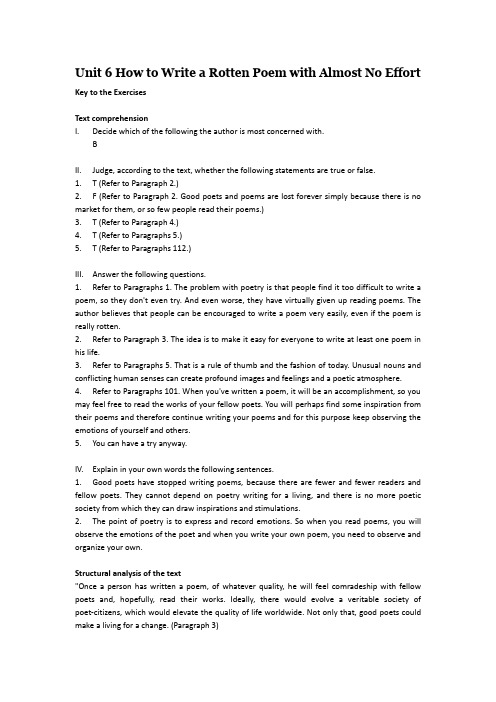
Unit 6 How to Write a Rotten Poem with Almost No Effort Key to the ExercisesText comprehensionI. Decide which of the following the author is most concerned with.BII. Judge, according to the text, whether the following statements are true or false.1. T (Refer to Paragraph2.)2. F (Refer to Paragraph 2. Good poets and poems are lost forever simply because there is no market for them, or so few people read their poems.)3. T (Refer to Paragraph4.)4. T (Refer to Paragraphs5.)5. T (Refer to Paragraphs 112.)III. Answer the following questions.1. Refer to Paragraphs 1. The problem with poetry is that people find it too difficult to write a poem, so they don't even try. And even worse, they have virtually given up reading poems. The author believes that people can be encouraged to write a poem very easily, even if the poem is really rotten.2. Refer to Paragraph3. The idea is to make it easy for everyone to write at least one poem in his life.3. Refer to Paragraphs 5. That is a rule of thumb and the fashion of today. Unusual nouns and conflicting human senses can create profound images and feelings and a poetic atmosphere.4. Refer to Paragraphs 101. When you've written a poem, it will be an accomplishment, so you may feel free to read the works of your fellow poets. You will perhaps find some inspiration from their poems and therefore continue writing your poems and for this purpose keep observing the emotions of yourself and others.5. You can have a try anyway.IV. Explain in your own words the following sentences.1. Good poets have stopped writing poems, because there are fewer and fewer readers and fellow poets. They cannot depend on poetry writing for a living, and there is no more poetic society from which they can draw inspirations and stimulations.2. The point of poetry is to express and record emotions. So when you read poems, you will observe the emotions of the poet and when you write your own poem, you need to observe and organize your own.Structural analysis of the text"Once a person has written a poem, of whatever quality, he will feel comradeship with fellow poets and, hopefully, read their works. Ideally, there would evolve a veritable society of poet-citizens, which would elevate the quality of life worldwide. Not only that, good poets could make a living for a change. (Paragraph 3)"But at least it's a poem and you've written it, which is an accomplishment that relatively few people can claim. (Paragraph 10)"Chances are, you'll find their offerings stimulating and refreshing. You might even try writing some more of your own poems, now that you've broken the ice. Observe others emotions and experience your own -- that's what poetry is all about. (Paragraph 11)Rhetorical features of the text"The last line of your poem should deal with the future in some way." (Paragraph 8) "How that poem (like yours, when you're finished) is rotten." (Paragraph 10)Vocabulary exercisesI. Explain the underlined part in each sentence in your own words.1. extremely intense2. The practical principle3. just like; following the example of4. Probably; Quite likely5. made a start despite the difficultyII. Fill in the blank in each sentence with a word taken from the box in its appropriate form.1. epic2. squalid3. veritable4. pounded5. aroma6. evolved7. lyrics 8. claimedIII. Fill in the blanks with the appropriate forms of the given words.1. imponderables2. poetic/poetical3. accidentally4. unsought5. cuddliest6. juicy7. disorientated 8. versedIV. Fill in the blank(s) in each sentence with an appropriate phrasal verb or collocation taken from the text.1. conjures up2. dealt with3. seek out4. think of5. ended/started with6. break ... up7. relates to8. came up withV. Give a synonym or an antonym of the word underlined in each sentence in the sense it is used.1. Synonym: unfamiliar (strange)2. Synonym: fellowship (brotherhood)3. Antonym: lower (degrade)4. Antonym: exceptional (excellent)5. Synonym: caress (hug, embrace)6. Antonym: unrealistic (impractical)7. Synonym: skilled (expert, proficient, successful)8. Synonym: product (composition)VI. Explain the underlined phrasal verbs in your own words.1. affects2. catching up with3. been involved in4. tell exactly5. rejected6. make understood7. tried to get8. thought seriously aboutGrammar exercisesI. Complete the following sentences with the appropriate verb forms.1. shake2. to do, wait, to let3. standing4. finding(To in the expression with a view to is a preposition.)5. take, make, drink6. leave(When rather than appears at the beginning of a sentence, we use bare infinitive after it.)7. being spoken8. be, lookII. Complete the sentences using either the infinitive or the -ing form of the verbs in brackets.1. to drink2. turning3. to tell4. to give5. getting6. to check7. living 8. taking9. to lift 10. talkingIII. Put the verbs in brackets into the correct form.1. getting up, walking2. making3. carry4. getting5. leading6. live7. writing 8. stealingIV. Complete each sentence with what you think the most appropriate of the four choices given.1. C (We use the simple present to describe things that are always true or situations that exist now and will go on indefinitely.)2. D3. B4. D5. C6. A (In a formal style, the verb should be singular when the subject is "either".)7. A8. CV. Complete the following sentences with the appropriate forms of the verbs given.1. has been ringing2. had been made up3. will be giving4. comes5. would have6. was getting7. started(We use the past tense in the clauses after it's time, would rather, wish.)8. had been9. will improve/improves(The verb hope can be followed by a present tense with a future meaning, especially in the first person.)10. says(The simple present is often used in introducing quotations.)VI. Make sentences of your own after the sentences given below, keeping the italicized parts in your sentences.1. . The course you are going to take will not be exciting. It won't even be interesting. But you will find it helpful in the long run.2. . Now that you have written your first poem, you should not find it difficult to compose a second one.Translation exercisesI. Translate the following sentences into Chinese.1. 这一天你过得很糟糕,或是有了个绝妙的想法,又或者遭遇车祸,再或情场失意,你想把它永久记录下来。
Unit 6 How to Write a Rotten Poem with Almost No Effort课文翻译综合教程三
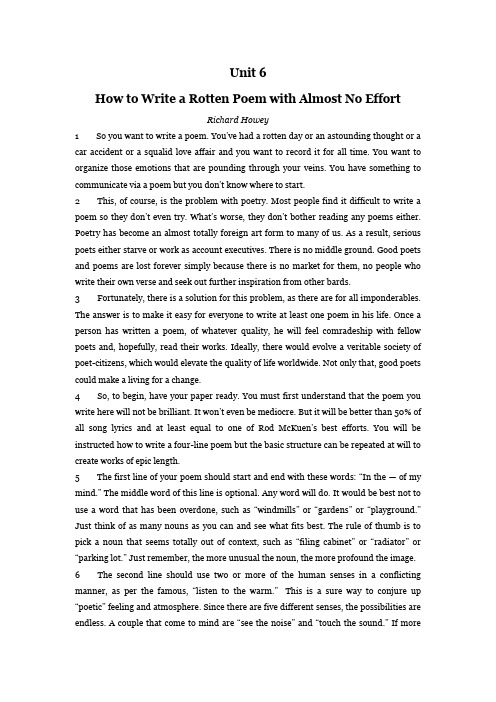
Unit 6How to Write a Rotten Poem with Almost No EffortRichard Howey1 So you want to write a poem. You’ve had a rotten day or an astounding thought or a car accident or a squalid love affair and you want to record it for all time. You want to organize those emotions that are pounding through your veins. You have something to communicate via a poem but you don’t know where to start.2 This, of course, is the problem with poetry. Most people find it difficult to write a poem so they don’t even try. What’s worse, they don’t bother reading any poems either. Poetry has become an almost totally foreign art form to many of us. As a result, serious poets either starve or work as account executives. There is no middle ground. Good poets and poems are lost forever simply because there is no market for them, no people who write their own verse and seek out further inspiration from other bards.3 Fortunately, there is a solution for this problem, as there are for all imponderables. The answer is to make it easy for everyone to write at least one poem in his life. Once a person has written a poem, of whatever quality, he will feel comradeship with fellow poets and, hopefully, read their works. Ideally, there would evolve a veritable society of poet-citizens, which would elevate the quality of life worldwide. Not only that, good poets could make a living for a change.4 So, to begin, have your paper ready. You must first understand that the poem you write here will not be brilliant. It won’t even be mediocre. But it will be better than 50% of all song lyrics and at least equal to one of Rod McKuen’s best efforts. You will be instructed how to write a four-line poem but the basic structure can be repeated at will to create works of epic length.5 The first li ne of your poem should start and end with these words: “In the — of my mind.” The middle word of this line is optional. Any word will do. It would be best not to use a word that has been overdone, such as “windmills” or “gardens” or “playground.” Just think of as many nouns as you can and see what fits best. The rule of thumb is to pick a noun that seems totally out of context, such as “filing cabinet” or “radiator” or “parking lot.” Just remember, the more unusual the noun, the more profound the image.6 The second line should use two or more of the human senses in a conflicting manner, as per the famous, “listen to the warm.”This is a sure way to conjure up “poetic” feeling and atmosphere. Since there are five different senses, the possibilities are e ndless. A couple that come to mind are “see the noise” and “touch the sound.” If morecomplexity is desired other senses can be added, as in “taste the color of my hearing,” or “I cuddled your sight in the aroma of the night.” Rhyming, of course, is option al.7 The third line should be just a simple statement. This is used to break up the insightful images that have been presented in the first two lines. This line should be as prosaic as possible to give a “down-to-earth” mood to the poem. An example wou ld be “she gave me juice and toast that morning,” or perhaps “I left for work next day on the 8:30 bus.” The content of this line may or may not relate to what has gone before.8 The last line of your poem should deal with the future in some way. This gives the poem a forward thrust that is always helpful. A possibility might be, “tomorrow will be a better day,” or “I’ll find someone sometime,” or “maybe we’ll meet again in July.” This future-oriented ending lends an aura of hope and yet need not be grossly optimistic.9 By following the above structure, anyone can write a poem. For example, if I select one each of my sample lines, I come up with:In the parking lot of my mind,I cuddled your sight in the aroma of the night.I left for work next day on the 8:30 bus.Maybe we’ll meet again in July.10 Now that poem (like yours, when you’re finished) is rotten. But at least it’s a poem and you’ve written it, which is an accomplishment that relatively few people can claim.11 Now that you’re a poet, feel free to read poetry by some of your more accomplished brothers and sisters in verse. Chances are, you’ll find their offerings stimulating and refres hing. You might even try writing some more of your own poems, now that you’ve broken the ice. Observe o thers’ emotions and experience your own —that’s what poetry is all about.12 Incidentally, if you find it impossible to sell the poem you write to Bobby Goldsboro or John Denver, burn it. It will look terrible as the first page of your anthology when it’s published.轻轻松松写烂诗理查德·豪伊1. 这一天你过得很糟糕,或是有了个绝妙的想法,又或者遭遇车祸,再或情场失意,你想把它永久记录下来。
“综合英语”(3、4)课程教学大纲
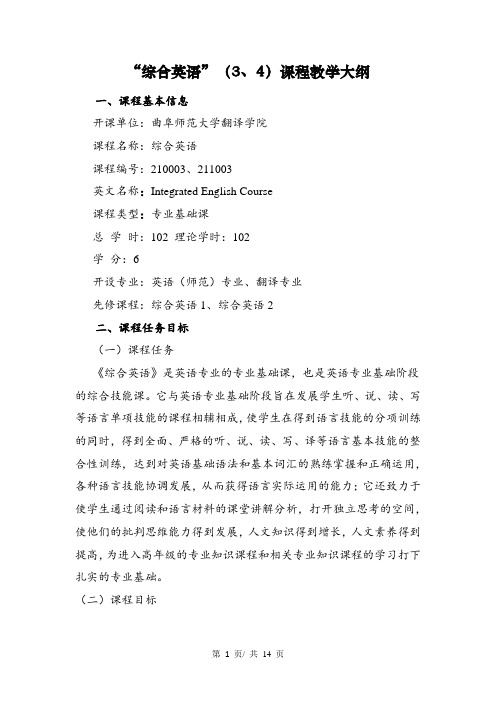
“综合英语”(3、4)课程教学大纲一、课程基本信息开课单位:曲阜师范大学翻译学院课程名称:综合英语课程编号:210003、211003英文名称:Integrated English Course课程类型:专业基础课总学时:102 理论学时:102学分:6开设专业:英语(师范)专业、翻译专业先修课程:综合英语1、综合英语2二、课程任务目标(一)课程任务《综合英语》是英语专业的专业基础课,也是英语专业基础阶段的综合技能课。
它与英语专业基础阶段旨在发展学生听、说、读、写等语言单项技能的课程相辅相成,使学生在得到语言技能的分项训练的同时,得到全面、严格的听、说、读、写、译等语言基本技能的整合性训练,达到对英语基础语法和基本词汇的熟练掌握和正确运用,各种语言技能协调发展,从而获得语言实际运用的能力;它还致力于使学生通过阅读和语言材料的课堂讲解分析,打开独立思考的空间,使他们的批判思维能力得到发展,人文知识得到增长,人文素养得到提高,为进入高年级的专业知识课程和相关专业知识课程的学习打下扎实的专业基础。
(二)课程目标1. 综合英语课程主要通过对学生进行语言基础训练与篇章讲解分析,以及通过组织学生积极参与课堂的各种语言交际活动,使学生掌握英语语音、词汇、语法的基础知识,扩大词汇量和熟悉英语常用句型,逐步提高语篇阅读理解能力,了解英语各种文体的表达方式和特点,具备基本的口头和笔头表达能力和交际技能,达到《高等学校英语专业英语教学大纲》所规定的听、说、读、写、译等技能的要求。
2. 通过一年的学习,学生的各项技能应该达到《高等学校英语专业英语教学大纲》所描述的二级要求;通过两年的学习,学生的各项技能应该达到《高等学校英语专业英语教学大纲》所描述的四级要求。
3. 在二年级,要求学生一定要打好扎实的语言基本功。
综合英语的任务是传授系统的基础语言知识(含语音、语法、语汇、篇章、结构、语言功能、意念等),训练基本语言技能(含听、说、读、写、译),培养学生良好的学习习惯,指导学习方法,加强学生思维能力和创新能力的培养。
《综合英语》课程教学大纲
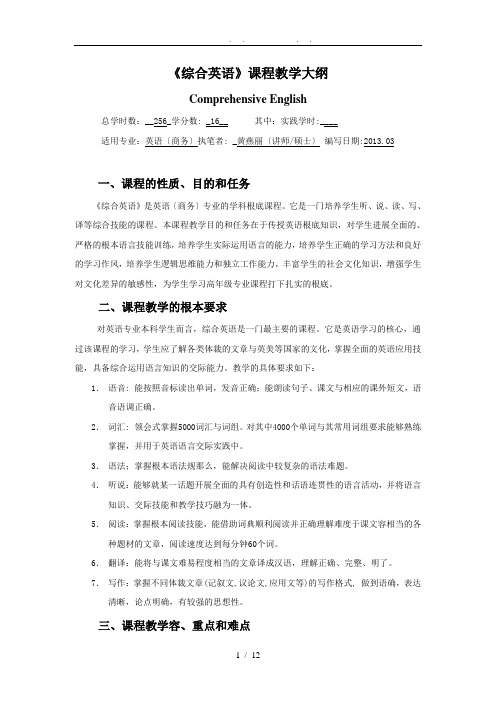
《综合英语》课程教学大纲Comprehensive English总学时数:__256_学分数: _16__ 其中:实践学时:____适用专业:英语〔商务〕执笔者: _黄燕丽〔讲师/硕士〕编写日期:2013.03一、课程的性质、目的和任务《综合英语》是英语〔商务〕专业的学科根底课程。
它是一门培养学生听、说、读、写、译等综合技能的课程。
本课程教学目的和任务在于传授英语根底知识,对学生进展全面的、严格的根本语言技能训练,培养学生实际运用语言的能力,培养学生正确的学习方法和良好的学习作风,培养学生逻辑思维能力和独立工作能力,丰富学生的社会文化知识,增强学生对文化差异的敏感性,为学生学习高年级专业课程打下扎实的根底。
二、课程教学的根本要求对英语专业本科学生而言,综合英语是一门最主要的课程。
它是英语学习的核心,通过该课程的学习,学生应了解各类体裁的文章与英美等国家的文化,掌握全面的英语应用技能,具备综合运用语言知识的交际能力。
教学的具体要求如下:1.语音: 能按照音标读出单词,发音正确;能朗读句子、课文与相应的课外短文,语音语调正确。
2.词汇: 领会式掌握5000词汇与词组。
对其中4000个单词与其常用词组要求能够熟练掌握,并用于英语语言交际实践中。
3.语法;掌握根本语法规那么,能解决阅读中较复杂的语法难题。
4.听说:能够就某一话题开展全面的具有创造性和话语连贯性的语言活动,并将语言知识、交际技能和教学技巧融为一体。
5.阅读:掌握根本阅读技能,能借助词典顺利阅读并正确理解难度于课文容相当的各种题材的文章,阅读速度达到每分钟60个词。
6.翻译:能将与课文难易程度相当的文章译成汉语,理解正确、完整、明了。
7.写作:掌握不同体裁文章(记叙文,议论文,应用文等)的写作格式, 做到语确,表达清晰,论点明确,有较强的思想性。
三、课程教学容、重点和难点教学容:本课程依据所选教材的容并结合实际情况,因材施教,帮助学生掌握所选教材中涉与的词汇、词组、课文与语法知识,同时进展听说、阅读、写作训练,使学生全面掌握英语的各项根本技能。
2021人教版选修六unit2《poems》word教案5
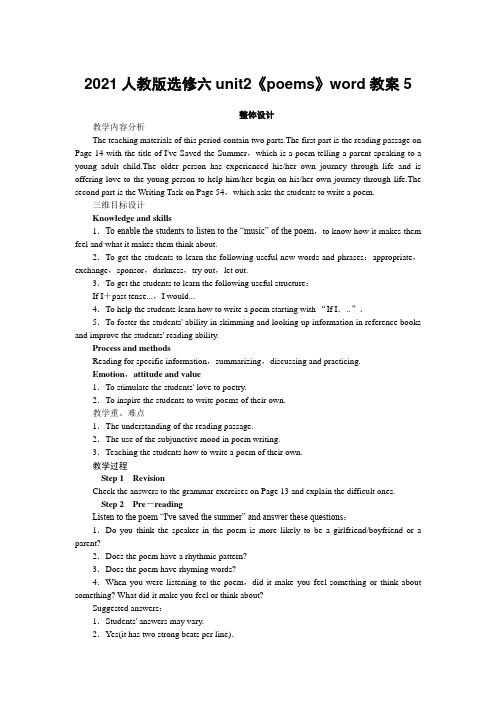
2021人教版选修六unit2《poems》word教案5整体设计教学内容分析The teaching materials of this period contain two parts.The first part is the reading passage on Page 14 with the title of I've Saved the Summer,which is a poem telling a parent speaking to a young adult child.The older person has experienced his/her own journey through life and is offering love to the young person to help him/her begin on his/her own journey through life.The second part is the Writing Task on Page 54,which asks the students to write a poem.三维目标设计Knowledge and skills1.To enable the students to listen to the “music” of the poem,to know how it makes them feel and what it makes them think about.2.To get the students to learn the following useful new words and phrases:appropriate,exchange,sponsor,darkness,try out,let out.3.To get the students to learn the following useful structure:If I+past tense...,I would...4.To help the students learn how to write a poem starting with “If I...”.5.To foster the students' ability in skimming and looking up information in reference books and improve the students' reading ability.Process and methodsReading for specific information,summarizing,discussing and practicing.Emotion,attitude and value1.To stimulate the students' love to poetry.2.To inspire the students to write poems of their own.教学重、难点1.The understanding of the reading passage.2.The use of the subjunctive mood in poem writing.3.Teaching the students how to write a poem of their own.教学过程Step 1RevisionCheck the answers to the grammar exercises on Page 13 and explain the difficult ones.Step 2Pre-readingListen to the poem “I've saved the summer” and answer these questions:1.Do you think the speaker in the poem is more likely to be a girlfriend/boyfriend or a parent?2.Does the poem have a rhythmic pattern?3.Does the poem have rhyming words?4.When you were listening to the poem,did it make you feel something or think about something? What did it make you feel or think about?Suggested answers:1.Students' answers may vary.2.Yes(it has two strong beats per line).3.Yes.4.Students' answers may vary.Step 3Reading1.Circle the words that rhyme.What is unusual about the rhyming words in the last four lines?2.Try beating or clapping the strong beats of the rhythm as you read the poem to yourself.Now listen to the poem again and clap the strong beats.Suggested answers:1.Circled words:you,new;need,feed;nineteen,mean;way,day;own,own.The rhyming words in the last four lines are unusual because they are the same word although they each have a different meaning.2.The strong beats of the rhythm are marked below:I've saved the sum merAnd I give it all to youTo hold on winter morn ingsWhen the snow is new.I've saved some sun lightIf you should ever needA place away from dark nessWhere your mind can feed.And for myself I've kept your smileWhen you were but nine teenTill you're older you'll not knowWhat brave young smiles can mean.I know no ans wersTo help you on your wayThe ans wers lie some whereAt the bott om of the day.But if you've a need for loveI'll give you all I ownIt might help you down the roadTill you've found your own.Step 4DiscussionIn small groups discuss these questions:1.Who is the speaker in the poem and who is he/she speaking to? Give reasons to support your answer.2.Which of the following is the closest to the speaker's message? Give a reason for your choice.A.If it's cold,I'll warm you;if it's dark,I'll give you light;if you're hungry,I'll feed you;if you want love,I'll give it to you.B.Although the future may be difficult for you,whenever you need warmth and love,remember I'll have some to give you.C.While you're away I'll remember your smile and I'll love you always.When you return,I hope you will love me.Suggested answers:1.A parent(mother or father)speaking to a young adult child(son or daughter).We know that the speaker is probably a parent because he/she is offering the child unconditional love(But if you've a need for love,I'll give you all I own).We know that the son/daughter is a young adult because the speaker refers to the time when you were but nineteen.2.BStep 5Language studyShow the students the following language points in a slide show.1.appropriate(P13)【原句再现】Match the beginning of each sentence with the appropriate ending.把每个句子的开头与其合适的结尾连在一起。
译林版英语九上Unit 6t教学案

1Unit 6 Comic strip& welcome to the unit 教学案班级:九一 教师: 使用时间: 总课时数:【教学目标】1.了解和电视节目相关的词汇;2. 了解电视节目的分类;3. 学会谈论喜欢的电视节目类型。
【教学重难点】学会谈论喜欢的电视节目类型。
【设境示标】复习上一节课内容,展示本课学习目标。
【问题引领】Activity I. 请同学们预习课文P78-79页内容, 听录音,跟读,做到能正确地朗读该内容中出现的生词和对话内容: Task1.找出其中含有的新单词,并试读、试背。
Task2.回答下列问题1. Does Eddie get bored all day ?__________________________________________________________________ 2. What does Eddie do in the morning ?__________________________________________________________________ 3. What does Eddie do in the afternoon ?__________________________________________________________________ 4. What’s Millie’s favourite TV programme ? Why ?___________________________________________________________________ 5. How about Daniel/Amy/Simon ?___________________________________________________________________ Task3.翻译下列词组和句子,并记忆。
- 1、下载文档前请自行甄别文档内容的完整性,平台不提供额外的编辑、内容补充、找答案等附加服务。
- 2、"仅部分预览"的文档,不可在线预览部分如存在完整性等问题,可反馈申请退款(可完整预览的文档不适用该条件!)。
- 3、如文档侵犯您的权益,请联系客服反馈,我们会尽快为您处理(人工客服工作时间:9:00-18:30)。
Windmill 英 ['wɪndmɪl]
n.风车 v.(使)像风车一样旋转 用作名词 (n.) The grinder was powered by a windmill. 这磨盘由风车提供动力。 用作动词 (v.) The propeller will windmill and crank the engine. 螺旋浆将旋转并转动引擎的曲柄。
4 So, to begin, have your paper ready. You must first understand that the poem you write here will not be brilliant. It won‟t even be mediocre. But it will be better than 50% of all song lyrics and at least equal to one of Rod McKuen‟s best efforts. You will be instructed how to write a four-line poem but the basic structure can be repeated at will to create works of epic length.
filing cabinet美 ['kæ bɪnət]档案橱柜
That filing cabinet contain invoice ordered by date. 那个文件柜中的发票是按日期顺序整理好的。
radiator美 [„reɪdieɪtər] n.暖气片;散热器;辐射体 Profound adj.深奥的;渊博的;极度的;意义深远的
How to Write a Rotten Poem with Almost No Effort
1 So you want to write a poem. You’ve had a rotten day or an astounding thought or a car accident or a squalid love affair and you want to record it for all time. You want to organize those emotions that are pounding through your veins. You have something to communicate via a poem but you don’t know where to start.
there are for all imponderables. The answer is to make it easy for everyone to write at least one poem in his life. Once a person has written a poem, of whatever quality, he will feel comradeship with fellow poets and, hopefully, read their works. Ideally, there would evolve a veritable society of poet-citizens, which would elevate the quality of life worldwide. Not only that, good poets could make a living for a change.
2 This, of course, is the problem with poetry. Most people find it difficult to write a poem so they don‟t even try. What‟s worse, they don‟t bother reading any poems either. Poetry has become an almost totally foreign art form to many of us. As a result, serious poets either starve or work as account executives. There is no middle ground. Good poets and poems are lost forever simply because there is no market for them, no people who write their own verse and seek out further inspiration from other bards.
Imponderable英 [ɪm'pɒndərəbl]
n.无法估量的事物 adj.无重量的;无法计算的;不可估价的 用作名词 (n.) We can„t predict the outcome. There are too many imponderables. 我们无法预测结果。难以逆料的情况太多了。 用作形容词 (adj.) The effect of his new method is imponderable. 他的新方法所起的作用是无法正确估计的
Squalid 英 ['skwɒlɪd]
The downtown streets looked ugly, squalid, and hostile. 市中心的街道看上去丑陋、肮脏、 充满敌意。 In these squalid surroundings she becomes slovenly herself. 在这肮脏的环境中,她本人也变得十分邋遢懒散 了。
rule of thumb
经验法则, 靠经验估计
I never weigh anything when I„m cooking-I just do it by rule of thumb. 我烹饪从来不称重量——只是凭经验下料。 As a rule of thumb, you should cook a chicken for 20 minutes for each pound that it weighs. 凭经验估计,每磅鸡肉应烹调20分钟
Verse 英 [vɜːs]
n.诗;韵文;诗节 vi.作诗 vt.诗化;在诗中表现;对 ... 精通
用作名词 (n.)
There are four verses in each poem. 每首诗有四个诗节。
用作不及物动词 (vi.)
It was in blank verse that she sang. 她以无韵诗体作诗。
adj.肮脏的;卑鄙的;悲惨的
1.
2.
Vein 英 [vein]
n.静脉;纹理;叶脉;岩脉 vt.使有脉络;用脉络装饰
1.
2.
The doctor injects glucose into the patient's vein. 医生把葡萄糖注射入病人的静脉 . The selection of a suitable vein model is the key for vein analysis. 摘要选用适用的纹理模型是进行纹理分析的关键。
adj.(形容词)
用作形容词 (adj.)
This place has an odious smell; something must be rotten. 这个地方有一股臭味,一定有东西腐烂了。 The child is spoiled rotten. 这个小孩被宠坏了。
用作副词 (adv.)
Ideally, there would evolve a veritable society of poet-citizens, which would elevate the quality of life worldwide.
Paraphrase:
An ideal situation would be the development of a society composed of citizens who are dedicated to poetry writing, and from doing this people will have better life quality.
6 The second line should use two or more of the human senses in a conflicting manner, as per the famous, “listen to the warm.” This is a sure way to conjure up “poetic” feeling and atmosphere. Since there are five different senses, the possibilities are endless. A couple that come to mind are “see the noise” and “touch the sound.” If more complexity is desired other senses can be added, as in “taste the color of my hearing,” or “I cuddled your sight in the aroma of the night.” Rhyming, of course, is optional.
Rotten
英 ['rɒtn]
adj.腐烂的;腐朽的;<口>极坏的;讨厌的 adv.非常 rotten的基本意思是“腐烂的,腐朽的”,引申可指“令人不愉快 的”“很差的,糟糕的”。 rotten egg的本义指“坏蛋”,引申可指“品行不好的人”,常用作孩子 们之间的戏语。 rotten只有最高级,没有比较级
